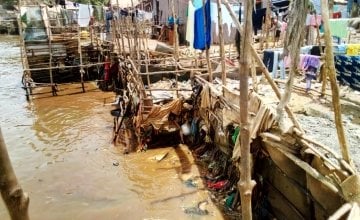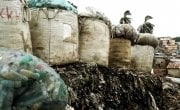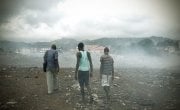
Read our 2024 annual report

Knowledge Hub
Management of waste is something that many of us take for granted but in Sierra Leone, a waste crisis has brought flooding and life-threatening disease to its capital city of Freetown.
Situated on the south-west coast of West Africa, Sierre Leone may not be the first country that comes to mind when thinking about climate change.
However, the country has seen the very real impact of climate change in recent years - including devastating flash flooding and landslides that claimed the lives of thousands of people in August 2017.
Ranked 184 of 189 countries in the Human Development Index, Sierra Leone has experienced shifts in weather patterns and intensified trains during its wettest period from July to September.
In the last 15 years, devastating flash flooding and landslides have affected over 220,000 people, killed thousands and caused economic damage costing tens of millions of dollars.
For Freetown, a significant factor in such disasters is the absence or low capacity of drainage systems – exacerbated by the accumulation of waste and poor city planning. In fact, only 21% of Freetown's waste is estimated to be properly collected and disposed of, leaving the rest – roughly 550 tons per day – to be indiscriminately burned or dumped in streets, waterways and illegal dumpsites.

Who's most at risk?
The poorest and most vulnerable are typically most at risk to flooding and landslides, because they often live in slum settlements on insecure surfaces and slopes on hillsides or close to waterways. Slum areas are also characterised by poor drainage infrastructure and little access to the limited waste services available.
Of Freetown’s rapidly growing population, it is estimated that roughly 19% (or about 300,000) live in slum or informal settlement areas. The waste management capacity of the Freetown authorities is ineffective to meet the present and increasing needs, particularly for those in slum and hard to reach areas of the city.
Are there no official dumpsites?
Freetown has two authorized waste disposal sites: Kingtom in the west and Granville Brook in the east. However, both sites are already beyond maximum capacity and lack basic planning (such as entrance regulation, roads, weighing equipment) or the staff to manage orderly and proper waste disposal.
The city’s official dumpsites have significant issues related to safety and security, particularly for the informal communities who work and often live there.
The daily hazards include waste contaminants causing infection and disease; respiratory illnesses related to waste burning and off-gassing (chemical gas discharge); and physical injuries related to indiscriminate dumping and scavenging on unstable terrain.
Freetown’s dumpsites also contribute to citywide environmental damage and increased risk of sickness through groundwater contamination caused by uncontrolled dumping of both toxic and non-toxic refuse, and faecal waste.
In many slum communities, families often adopt unsafe and unhealthy waste disposal practices as they are unwilling or unable to spend their limited income on proper waste collection services.
Although the UN reports that as much as 80% of Freetown’s waste could be recycled or used as compost, there are no formal sorting facilities to separate waste. Informal workers, street collectors and dumpsite scavengers collect some types of plastics which are transported for recycling out of Sierra Leone.




Natural disasters
With annual rainfall of 3,600 litres per square metre, natural disasters have plagued the country for years.
The devastating flash flooding and landslides in 2017 were followed by citywide flooding in August this year that resulted in further loss of life. Such disasters illustrate the ongoing issue of waste in drainage systems.
Inefficient drainage systems and poor waste management are also a major public health issue and intensify disasters. Clogged drainages lead to flooding and stagnant water, with vulnerable slums transformed into waterborne epidemic zones carrying diseases like malaria, cholera and typhoid. Mud, waste and overflowing sewage from drains, pits and sewers also enter waterways, causing citywide contamination of Freetown’s water sources.
Historically low levels of investment in disaster mitigation (e.g. hazard mapping) and infrastructure (e.g. drainages) continue to increase the risk posed by destructive, rainfall-related climate events, while rapid urbanisation and deforestation for unplanned housing, profiteering and cooking and burning is also increasing vulnerability to soil erosion, landslides and floods.
Finding solutions
As well as continuing to respond to emergencies, Concern Worldwide initiated two projects this year focused on preventative approaches to Freetown’s waste and flooding issues.
With support from the British Government’s international development department (DFID), Concern is working with low-income communities in selected slums and hard-to-reach areas in order to develop effective and scalable solid waste interventions for such locations.
In another project funded by the World Bank, Concern is supporting communities in the construction of approximately 1,000 meters of drainage systems across 10 high flood-risk areas in Freetown. The project will help curb the effect of natural disasters and strengthen community resilience.
With a €1 million budget, these innovative projects can pave the way for a scale-up throughout the city, and provide Concern with critical lessons to facilitate economic recovery, develop resilience and reduce disaster and health risks.
Concern has been working in Sierra Leone since 1996, beginning during the devastating civil war which took place between 1991 and 2002.
Our integrated programming approach aims to tackle all dimensions of poverty, focusing on the overlapping areas of health, education and livelihoods, while maintaining our response to emergencies.
Learn more about our work in Sierra Leone


